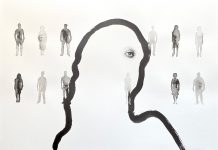In a Q&A with editor in chief Steve Fennessy, Atlanta magazine writer at large Charles Bethea discussed how he got Aubrey Lee Price to sit down with him for hours.
Aubrey Lee Price has talked to no other journalist thus far. Why do you think he talked with you?
I think the way I contacted Price—through a hand-written, half-page letter, given to his lawyer in early January after a court hearing—was helpful in setting my request apart from the less personal ones that he received from elsewhere. (The letter-writing approach had worked for me a few years earlier, when reporting this story for Atlanta magazine; I’ve used it ever since.) I also know, since Price told me so, that my mentioning a mutual acquaintance helped. This man, Doug Brown, was a teenager when he was in one of Price’s youth ministry groups in the nineties. By coincidence, Brown had come to know my mother—through his wife—many years later, and I’d spoken to Brown in early January when I’d started looking into a story on Price. I think that noting this mutual acquaintance helped make Price feel like he and I shared a common world, at least in small part, and that I would be a good listener.
His story of what he did on the lam seems outlandish. What did you think when you first heard it?
I was stunned and excited. I kept checking to make sure my digital recorder was turned on and working properly. (It actually ran out of battery power at the very end of our first long interview, which had me sweating while I replaced the battery.) The journalist in me, of course, was also highly skeptical—particularly considering that Price has himself admitted to having committed fraud. But the human part of me wanted to believe. His story was told persuasively, and with what seemed like real feeling. He laughed, cried and sighed like a man who wasn’t hiding or lying anymore. He told me more than once: “I never want to lie again.”
So did you believe him then? Do you now?
I like to think I have the ability to sniff out a liar and his lies more often than not. In person, Price passed the sniff test. Sure, he intentionally and openly obscured some details in his story to “protect others who were involved,” as he told me. But he was able to immediately and persuasively answer most of my many questions, often in great, colorful detail. Maybe this was because he’d really had the kind of incredible experience that never leaves your mind. Or maybe it was because he’d written down a story, calling it The Inglorious Fugitive, whose details—real, fake, or embellished—he’d been memorizing for months, before we’d met.
What’s he like in person?
Lee Price is the kind of man you’d want to sit down and have a beer with, regardless of your differences. (Price didn’t drink alcohol for most of his life, so it might have to be root beer.) He’s very likable. He tells stories well, as you’d expect a former pastor to be able to tell them. He’ll quote Lynyrd Skynyrd lyrics one minute and the Book of Job the next. His intelligence is obvious, but it’s not academic or on display. His sense of humor is goofy, and a bit teenage, tending towards the early work of Will Ferrell. He recited one whole dinner scene from Talladega Nights for me.
I can honestly say that I enjoyed the ten hours I spent mostly listening to him talk, and that I was genuinely moved by much of what he had to say about life, family and (occasionally) financial institutions. The details of his “departure,” as he called it, strained the limits of credulity, but the tears he cried behind bars, when he told me he’d probably never hug his children again, were as real as any I’ve ever seen.
Read the full story, The Many Lives of Aubrey Lee Price










![The North Carolina Museum of Natural Sciences’ newest exhibit is a [pre]historic first](https://cdn2.atlantamagazine.com/wp-content/uploads/sites/4/2024/04/DD-3-100x70.jpg)



